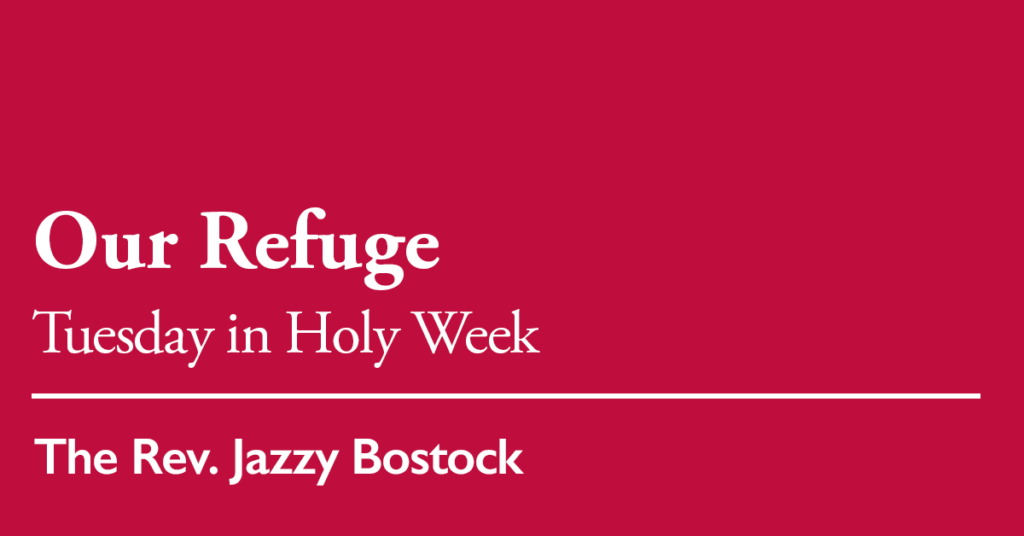Our Refuge, Tuesday in Holy Week – 2022
April 24, 2022
[RCL] Isaiah 49:1-7; Psalm 71:1-14; 1 Corinthians 1:18-31; John 12:20-36

There’s a song by Michael Joncas called On Eagle’s Wings. Part of the lyrics read:
“You who dwell in the shelter of the Lord,
who abide in His shadow for life,
say to the Lord, “My refuge, my rock in whom I trust!”
And He will raise you up on eagles’ wings,
bear you on the breath of dawn,
make you to shine like the sun,
and hold you in the palm of His hand.”
The song’s beautiful lyrics are based on the text of Psalm 91, but these words can also be found in our reading from Psalm 71 today. The psalm begins, “In you, O Lord, have I taken refuge; let me never be ashamed… Be my strong rock, a castle to keep me safe; you are my crag and my stronghold.” What might it mean for God to be our rock, or to dwell in God’s shelter? How do we make God our refuge?
Many of the hymns and prayers we use on Sunday mornings plead with God to abide with us. We ask for God’s presence to come among us, or for God to be known. Sometimes, we ask for divine intervention – for God to inspire peace in our hearts or kindness towards the stranger among us. Despite this plea, though, how often do we take it upon ourselves to draw near to God? It can be easy to sit in prayer that God be known to us – but are we taking the same initiative and making ourselves known to God? This small shift changes the responsibility we have, but it might also change the agency we have.
Dwelling in the shelter of the Lord – abiding in God’s shadow – what might that look like?
Now, on the one hand, we know that there is nowhere we can go where God is not. There is no place on this earth that is without God’s presence. So, in that regard, the whole world is in God’s shadow. On the other hand, though, there are places and times in our lives when it is easier to feel God’s presence. Perhaps you have heard others talk of times they have felt especially close with God. Sometimes, we feel closest to God when we are going through hard times. Something about the nature of tragedy or grief causes us to see the world through eyes more keenly aware of the graces around us. We are more reliant, perhaps, on the kindnesses of strangers – and thus more grateful for them when they arrive. We are more aware of the fragility of life – and, in that awareness of mortality, our senses seem heightened to really enjoy the lives we have, as they are, right now. We can suddenly look around us and see it all as what it is – a gift.
The season of Lent has, in some ways, been teaching us this. We began the season with Ash Wednesday – with crosses marked on our foreheads, bidding us remember that we are dust, and to dust we shall return. Our Lenten disciplines have, we hope, been bringing us closer to God by eliminating some of the distractions – some of the noise in our lives. Lent is designed to bring us back to that awareness that we are finite – limited – mortal. That we, too, like all other living things, will come to an end.
Lent lasts for 40 days of the year- it’s only a season among others. We are not a Lenten people in the Christian faith so much as a Resurrection people, an Easter people. We are not supposed to be dreary all the time, walking around with ashen crosses on our foreheads. Similarly, we are not called to live in a state of perpetual grief. Though we may feel God near to us during hard times, there is nothing wise nor holy nor right about seeking out pain in order to experience that closeness.
So, how do we take the lessons of Lent – the reminder of that mortality – and allow that awareness to propel us toward God, toward dwelling and abiding with God at all times, and in all places?
It might be a simple awareness. How can you look at the world – look at your world, right now, in this minute – and see a gift in it? Perhaps there’s a breeze outside the window or hints of spring. Perhaps the sun is out, glistening on the sidewalk. Perhaps you have a hot cup of coffee or tea in your hands, and you can see the steam rising from the mug. What surrounds you? What are the sights and sounds of your life?
When we look at our lives with gratitude – recognizing that those lives are finite – we can see God’s fingerprints more clearly. We see that our entire lives are lived in God’s safety, in God’s refuge. We see, as the psalmist says, that we have been sustained by God from our very beginnings.
May we dwell in this shelter – in this safety – in this awareness. And may we find that God is bearing us up on eagles’ wings. Amen.
Don’t forget to subscribe to the Sermons That Work podcast to hear this sermon and more on your favorite podcasting app! Recordings are released the Thursday before each liturgical date.
Receive Free Weekly Sermons That Work Resources!


